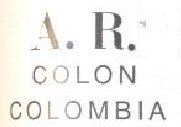Stamp: "A.R." Colon Colombia Overprint (Panama 1898)
"A.R." Colon Colombia Overprint (Panama 1898)
01 January (Panama ) within release Aknowledgement of Receipt Stamps goes into circulation Stamp "A.R." Colon Colombia Overprint face value 5 Panamanian centavo
| Stamp "A.R." Colon Colombia Overprint in catalogues | |
|---|---|
| Michel: | Mi: PA 25a |
| Yvert et Tellier: | Yt: PA-CO AR5a |
Stamp is horizontal format.
Handstamped in GREEN. Not listed separately by SN, who claims this handstamp to be considered by experts to be a cancellation or a marking intended for a letter to receive special handling. Applied at Colon to various stamps in 1897-1904 in different colored inks for philatelic sale, it exists on cover, usually with the bottom line removed by masking the handstamp.Also in the issue Aknowledgement of Receipt Stamps:
- Stamp - "A.R." Colon Colombia Overprint face value 5;
- Stamp - "A.R." Colon Colombia Overprint face value 5;
- Stamp - "A.R." Colon Colombia Overprint face value 5;
Stamp "A.R." Colon Colombia Overprint it reflects the thematic directions:
A map is a symbolic depiction emphasizing relationships between elements of some space, such as objects, regions, or themes. Many maps are static, fixed to paper or some other durable medium, while others are dynamic or interactive. Although most commonly used to depict geography, maps may represent any space, real or imagined, without regard to context or scale, such as in brain mapping, DNA mapping, or computer network topology mapping. The space being mapped may be two dimensional, such as the surface of the earth, three dimensional, such as the interior of the earth, or even more abstract spaces of any dimension, such as arise in modeling phenomena having many independent variables. Although the earliest maps known are of the heavens, geographic maps of territory have a very long tradition and exist from ancient times. The word "map" comes from the medieval Latin Mappa mundi, wherein mappa meant napkin or cloth and mundi the world. Thus, "map" became the shortened term referring to a two-dimensional representation of the surface of the world.

